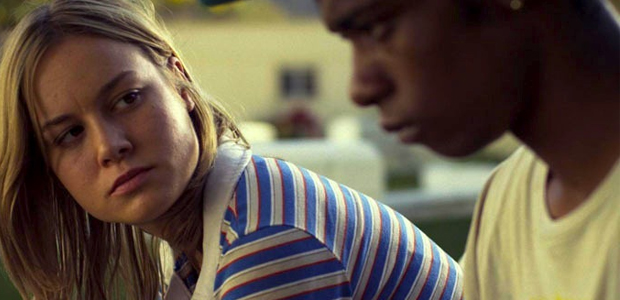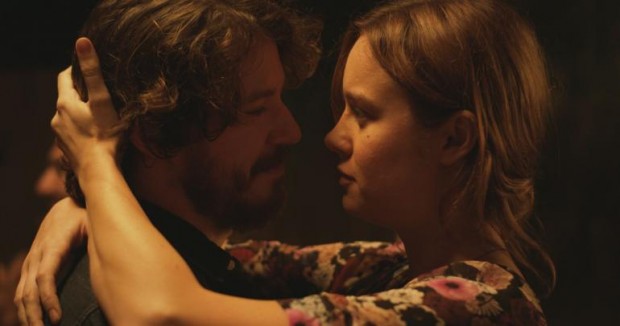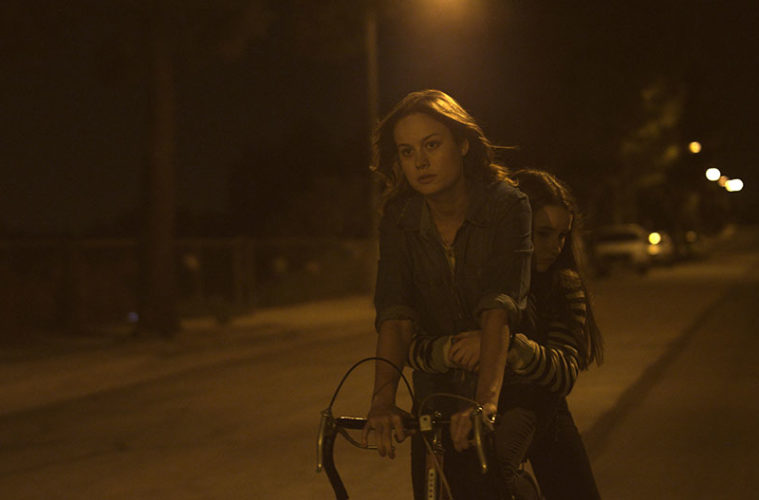Without a doubt, Short Term 12 is a film to keep on your radar this year, as it slowly expands theatrically each week. Brie Larson shines as Grace, a worker at a short term care facility for at-risk youth. The film as a whole is an astonishing achievement of subtlety and charm that engages your heart. So I jumped at the chance to interview Larson a few weeks ago and our conversation turned out to feel genuine and effortless.
Together we talked about how her first language was actually French and why she adores foreign language films, what films she actually watches of her own, the audition process and why it’s so broken, how it feels to keep bumping into the same actors from previous films she has done, and much more. Even if you’ve already seen Short Term 12, this is a conversation with the leading lady that will hold your interest. Read on for my full interview.
The Film Stage: I’ve been reading some interviews that you’ve done in promotion for this film and you’ve mentioned that you were kind of nervous. This is your first big, leading role and you’ve mentioned this wasn’t a traditional audition. Do you think if it had been one of the traditional, come in and read a few lines of dialogue audition, if you would have landed this role? Or do you think you still would have overcome it?
Brie Larson: You know, I don’t know because of a few things. One is that really informed me so much as to the true core of it was getting the chance to shadow in an actual facility. And I probably wouldn’t have been given that opportunity had I not been signed on to do this. But also the audition process is so hit or miss, I find. It seems so bizarre to me that someone will write a script, maybe a year ago or five, 10, 25 years ago, and now it’s getting made. And at this point in time, they’re auditioning. And on that Wednesday at noon in Santa Monica, in this room, I’m supposed to do what I’d do for a movie where I’d have much more preparation and mutual respect for the themes. I don’t know. I’ve always had a difficult time with the audition process in general because I don’t find it to be necessarily the most prospective way to show who should play this role. So who knows. I’m happy that it happened the way that it did.
I’m glad you brought that up because I don’t think I’ve ever heard any actor actually say that they enjoy the audition process. It seems like everyone’s in agreement that it’s pretty bad.
Yeah, but I don’t think the people on the other end enjoy it much, either. I don’t think that any casting director, director, producer, or anyone on the other side of the table enjoys it. They want every person that comes in to be the one that ends the search. We just haven’t discovered a way at this point to improve upon the process. And I don’t think there is a way to improve it. I think if there was more of a mutual understanding. If we all felt more comfortable saying, “Ugh. I need to try this again” or whatever, it would probably make it easier. But the idea is that it’s all based on a couple of days and one scene to draw from to show an entire range of a character in a specific moment after you’ve most likely been in a waiting room for 30 minutes with five other girls who are dressed similarly to you. And you hear somebody else reading the lines through the wall. It doesn’t make for a very magical process. But it’s part of it. Being on set isn’t easier. It’s just a different form of hard.

I’d say your career so far has been peppered with some diverse roles. Whether it’s Envy Adams from Scott Pilgrim or the character you played in The Spectacular Now. I’m curious, do you rewatch any past roles? Do you have any favorite films that you rewatch or is it all just kind of in the past and you’ve moved on?
The only movie I really rewatch is Scott Pilgrim.
Yes!
Because I absolutely love that movie and I think I look so different in that movie that I don’t really associate myself with it. So I can just watch the whole movie and I feel just fine. [Laughs]. I can just enjoy the movie. But maybe in more time. Maybe when I’m much older will I look back and it would be like looking at an old photo album. But for right now it just seems counterproductive.
Kaitlyn Dever is in The Spectacular Now with you briefly, and she’s obviously a huge role in this film.
Right.
And Mary Elizabeth Winstead was in both Pilgrim and Spectacular Now. Most of the time it seems like when you make a movie, and you finish it and wrap, you’re almost done with those people for a long period of time. It’s very rare that you see a lot of people continually acting with other people. Is it nice to feel that kind of community where it seems like you are bumping into each other again? Particularly since you are three young actresses that are continually wowing audiences.
Yeah! It’s awesome. You go into a film and it becomes a very intense sort of summer camp. You’re spending all of you’re time with all of these people and then the movie is over and as much as we all would like to see each other again, most of the time we don’t because we move on to the next camp. Sometimes, even though you care about them and you email or whatever, you don’t get the time to actually spend all that much time with them. So it’s always exciting and when you have that familiarity with someone that you enjoyed working with before, you kind of can’t be bad in a scene with them. You feel safe to explore that scene. So there is some serious upsides to it.
You’ve mentioned that you really tried to work yourself up emotionally for this role but also keep it internal. So much of Grace is within. You can see it in her eyes and it’s not necessarily what she does but how much she says. During a scene, I imagine there’s a lot going on in your mind. Did you ever miss a cue or are you able to still have all that going on in your head and yet be on point?
Well, I’m sure I missed a cue at some point, but even for auditions, the only thing I really care about when it comes to the night before doing something is getting the lines memorized. Because then once they’re memorized you can multi-task much better. If you’re trying to remember your lines on top of trying to remember five other things that have just been thrown at you, you can’t devote that much time to it. So I have the lines down and say them as Grace would say them, then I was able to add more layers to it and distract myself from what it was that I was saying. She’s not thinking about what she’s saying so I shouldn’t be thinking about it.

Having read a few interviews after your piece on your top 10 Criterion Collection films came out, it seems like you’ve been kind of poked and prodded about that. People are really interested in that.
[Laughs]
So, I noticed that you’ve fell for film by delving into all these foreign films. Obviously not every foreign film is in another language, but a lot of them are and in particular the ones on your list. So I’m curious if you’ve ever attempted to learn a foreign language. Maybe French?
Yeah! Well, French was my first language. And it’s something that as I got older and I started learning more English, I started losing more and more of my French speaking. But it is in there and I do know some of it still. But part of my love of foreign film is that I can get very lost in thought when I watch a movie. Sometimes movies become just a flood of visuals that allow me to meditate. I’ll start coming up with my own stories and my own thoughts and something on screen will spark an entire other movie in my head that I’m dreaming about. What is kind of helpful to me about foreign films is that I can’t do that. I have to be reading in order to understand what’s going on. I can’t tune it out. I can’t be making a collage or knitting at the same time as watching a movie. It becomes a very intense experience for me and it becomes a new discovery every time I watch it because there are things you inevitably miss by reading the subtitles. And it’s also a different point of view. It’s a different way of looking at things and a different focus. I just enjoy that. I enjoy the design of specific periods of time and in other countries. They’ve been very influential to me and I think have helped me in defining more of who I am and the stories that I like and what kind of actor that I want to be.
Yeah, watching a foreign film is almost like reading a book. You have to be tuned in and you have to be reading. If you’re not and you’re unable to speak that language they are speaking, you’re going to be lost. It’s a very intensive experience people have to have.
Yeah. And depending on what you’re watching there are certain things that in an American film you would never show. In a French film or a German film, they have no problem. There are things in I Am Yellow that in a lot of ways are shocking to me but they’re not shown as shocking in the movie. It’s just, “Yeah, this is a female body. Yeah, this is what it looks like when someone is naked and upset.” That’s just how it goes. You don’t bat an eye at it. I think there are cultural differences that I find to be very interesting and important for people to watch. To see outside of our own cultural norm.
Definitely. Jumping back to the audition process, I’m curious if you’re success with this one has led you to think of taking that approach again? Telling the director, “Hey, this is what I’m planning to do and bring to this role.”
Oh, I’m not thinking. That’s the way to do it. I’m starting to get more courageous in my approach to that. I don’t think that we all have to do everything the same exact way and I think that I’m an outside the box thinker and I want to continue to do that. I don’t think that my process for discovering a character will ever be the same place and that’s what’s exciting to me. Instead of confining myself to doing things the way that we’ve decided that they have to be in order for it to be good, it’s more exciting to me to do things a little bit differently and maybe in a more abstract way. If that’s what gets me the job then I feel more confident that I’m in the right place and I’m working with people that are understanding of me. We speak more of the same language. That’s so important when you’re trying to do something as abstract as film. It’s a lot of different moving parts and it’s a lot of different elements that are coming together in order to make one piece. You have to feel like you’re moving in the same direction as every body else.
Short Term 12 is now in theaters and expanding.

